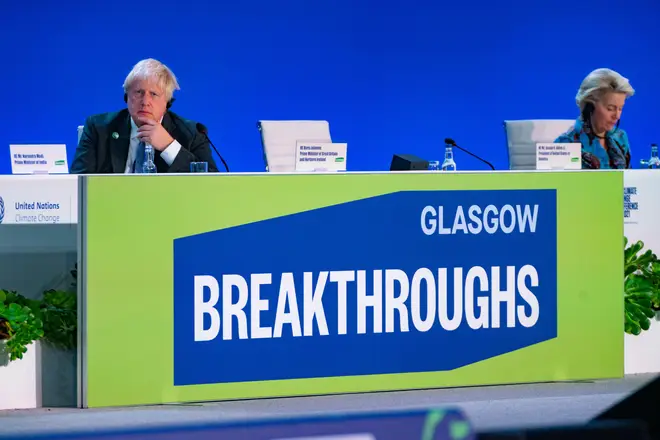
Iain Dale 7pm - 10pm
3 November 2021, 11:30

To put it in the Prime Minister’s terms, the final whistle has blown on the world leaders’ events at COP26.
Full time ended on a high note. As Boris Johnson described it, team world had clawed back a couple of goals against team global warming – though in this game there’s no counting on extra time.
It was a day of big announcements and bigger financial figures, and the gloom which appeared to have tainted the start of the summit after a less than successful G20 in Rome, lifted.
READ MORE: Queen tells COP26 leaders 'we're doing this not for us but for our children'
READ MORE: PM lists three cities that could be lost if no climate action is taken
So what happened?
For a start 105 countries pledged to cut methane emissions by 30% by 2030 – a policy driven by the US and EU.
Then John Kerry, the US climate envoy said Japan’s decision to offer up to $10bn dollars over five years could see the developed nation’s $100 billion climate finance target met next year asd it would leverage another $8bn from the private sector. This was welcome news after concerns it would be 2023 before it was met - missing the original deadline by three years.
More than 110 countries also signed a commitment to halt and reverse deforestation and land degradation by 2030. Countries representing 85 per cent of the planet’s forests made the pledge, including Brazil and Russia despite neither leader being there.
With that came another large packet of money - £8.75bn of public funding from governments and £5.3bn coming from private investment. That includes £1.47bn from Amazon founder Jeff Bezos specifically for land restoration in Africa - double what he had committed just a day earlier.
On top of that more than 40 world leaders backed a plan to fund clean technology around the world by 2030 - including the UK which had announced plans to launch a £400m package of investment with the US billionaire Bill Gates, with a focus on aviation in particular. The Prime Minister said the deal would help power a “green industrial revolution” and develop essential emerging technologies that were currently too expensive to be commercially successful.
And all of this after India had pledge the day before - to the surprise of many - to set a net zero target of 2070. While that’s 20 years after the key 2050 date, India had previously refused to set any target and there’s a belief that it’s other commitments to renewables could see that 2070 date brought forward quickly. Certainly Boris Johnson’s flattery of the Indian Prime Minister Modi today showed just how important that shift is being seen.
On a smaller scale meanwhile the Scottish Government became the first to pledge funding to the global south for loss and damage. It was only £1m but it was welcomed by Oxfam and many of the smaller countries at the sharp end of the climate crisis as “pioneering”.
But, and of course there is always a but, there are many issues still to be resolved, and while the leaders depart the negotiators roll their sleeves up and get to work.
For one thing, while it can be easy to sign a pledge the devil is in the delivery. On methane for instance major emitters like Russia, China and India are not involved. Further all the commitments are voluntary - there is no big stick to ensure countries stick to the plan. So activists are still concerned.
Similarly on deforestation a similar pledge was made in 2014 and there has been no real progress since. It’s thought with Brazil in particular now on board that could change although there is huge skepticism among climate campaigners that President Bolsanaro will really stick to the pledge.
And of course China still has very large doubts about the whole aim of 1.5C and ending its reliance on coal. Unsurprisingly Joe Biden has been extremely critical about Xi Jiping not being in the room - but the Chinese negotiators are.
So today there were more big numbers as it is finance day at CoP26 with the Chancellor focussing on the leveraging of private finance into clean green energy and other projects and industries. Without doubt the conversation has changed from just what governments can do, do what global firms can do with governments to combat climate change.
Last word to the US President at the very end of the day which sums up how many are now feeling: “so many things happened today I feel good about”.